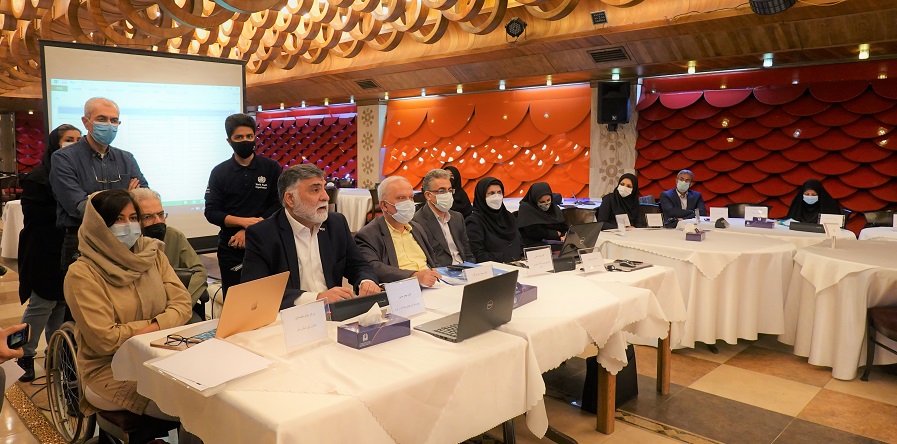
Speakers commence 2-day workshop on developing a national strategic plan to end tuberculosis (from left to right): WHO Consultant Dr Uzman Khan, WHO Representative ain Islamic Republic of Iran Dr Syed Jaffar Hussain, Director of Iranian Centres for Disease Control Dr Mohammad Mahdi Gouya, Research Deputy at Zanjan University of Medical Sciences Dr Alireza Shoghli, and National Director of TB Control Dr Mahshid Nasehi. Credit: WHO/Islamic Republic of Iran
21 April 2022 – In line with plans to support countries to strengthen their health sector response to tuberculosis (TB), the WHO Regional Office for the Eastern Mediterranean and country office, provided technical support to a 2-day workshop on 17–18 April, organized by the Ministry of Health and Medical Education of Islamic Republic of Iran, on development of a national strategic plan in line with most recent global guidance and available frameworks, to end TB in the country. The inaugural session of the workshop was attended by WHO Representative in Islamic Republic of Iran Dr Syed Jaffar Hussain, Director of the Iranian Centre for Disease Control Dr Mohammad Mahdi Gouya, National Director of Tuberculosis and Leprosy Control Department Dr Mahshid Nasehi, WHO Consultant Dr Uzman Khan, officials from the Ministry of Health and Medical Education and a range of stakeholders.
During the worksop, representatives of the national TB programme and participants discussed the development of appropriate national policies and strategies for implementation of comprehensive programmes for the prevention and control of communicable diseases aimed at achieving Sustainable Development Goal 3, which calls for ensuring healthy lives and promoting well-being for all at all ages.
“While Islamic Republic of Iran has a low prevalence of TB thanks to intense preventive, diagnostic, curative, as well as follow-up mechanisms in place, the triggers and the vulnerability for TB to shift from low prevalence to high prevalence are very much in place,” said Dr Hussain in his opening remarks. “The cross-border movement of people from neighbouring countries, such as Iraq, Afghanistan and Pakistan, who carry a high burden of the disease could potentially cause an increase of TB in Islamic Republic of Iran, so the country needs to invest domestically more in diagnostics, treatment, control, and human resources for the TB programme, particularly as a result of COVID-19 and its affect on the health system and services.”
Dr Hussain also stressed the importance of the workshop in paving the way for translation of national and global commitments, including implementation of WHO's Multisectoral Accountability Framework for TB, into tangible actions through mechanisms for multi-stakeholder national coordination, review, and monitoring and evaluation.
These mechanisms are fundamental to the development of national strategic plans for disease elimination. Long-term disease elimination strategic planning with budgeting based on in-depth analysis and evaluation of the disease programmes often requires additional expertise and assistance. Continuous monitoring and evaluation of plans and periodic review of performance helps such national programmes improve and stay abreast of changing priorities.
He also noted the negative impact of international sanctions on Islamic Republic of Iran’s access to global knowledge, developments in technology, diagnostic and therapeutic tools, which pose a great vulnerability to the country in terms of effectively addressing TB.
Dr Martin Van den Boom, WHO Regional Advisor, stressed that TB elimination could be achieved through a multisectoral approach, and reiterated WHO's continuing technical support in meeting the specific needs of each country.








